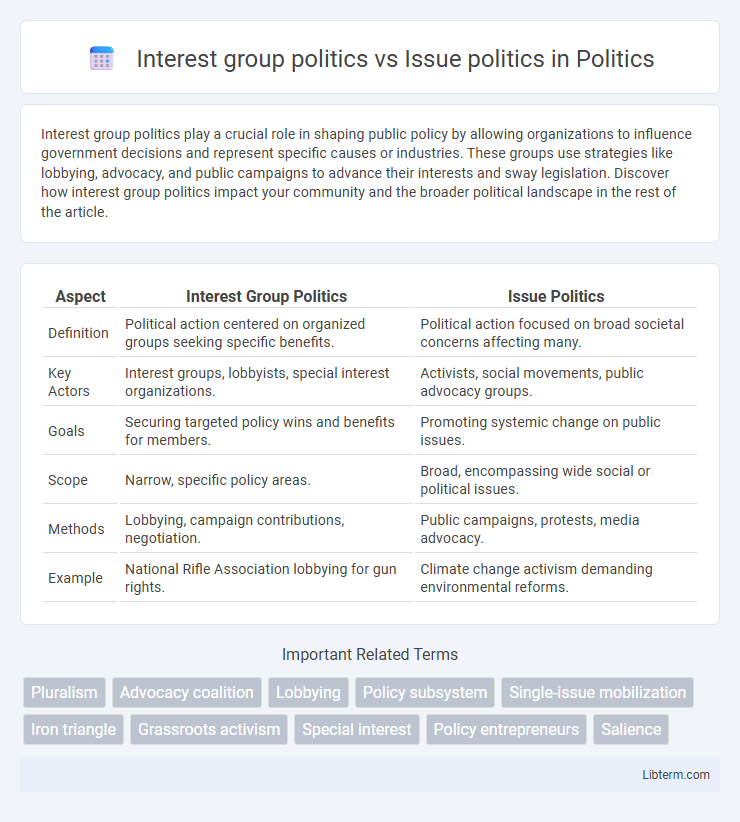Interest group politics play a crucial role in shaping public policy by allowing organizations to influence government decisions and represent specific causes or industries. These groups use strategies like lobbying, advocacy, and public campaigns to advance their interests and sway legislation. Discover how interest group politics impact your community and the broader political landscape in the rest of the article.
Table of Comparison
| Aspect | Interest Group Politics | Issue Politics |
|---|---|---|
| Definition | Political action centered on organized groups seeking specific benefits. | Political action focused on broad societal concerns affecting many. |
| Key Actors | Interest groups, lobbyists, special interest organizations. | Activists, social movements, public advocacy groups. |
| Goals | Securing targeted policy wins and benefits for members. | Promoting systemic change on public issues. |
| Scope | Narrow, specific policy areas. | Broad, encompassing wide social or political issues. |
| Methods | Lobbying, campaign contributions, negotiation. | Public campaigns, protests, media advocacy. |
| Example | National Rifle Association lobbying for gun rights. | Climate change activism demanding environmental reforms. |
Understanding Interest Group Politics
Interest group politics centers on organized groups advocating for specific policy outcomes by influencing legislators, regulatory agencies, and public opinion. These groups use lobbying, campaign contributions, and grassroots mobilization to advance their goals, shaping legislation to benefit their members. Understanding interest group politics requires recognizing the strategic interactions between groups and policymakers within the political system.
Defining Issue Politics
Issue politics centers on public debates driven by specific policy questions that affect broad segments of society, often involving ideological or moral considerations. Unlike interest group politics, which mobilize organized factions to influence legislation for particular benefits, issue politics typically engage a wide range of citizens united by shared concerns rather than narrow interests. Defining issue politics involves recognizing its dynamic nature, where public opinion and mass mobilization shape policy outcomes more than formal lobbying efforts.
Key Differences Between Interest Groups and Issue Politics
Interest group politics centers on organized groups advocating for specific member interests through lobbying and policy influence, while issue politics involves broader public debates on particular societal or policy issues without formal group structures. Interest groups rely on member resources and sustained engagement to impact legislation, whereas issue politics mobilizes diverse stakeholders often in episodic or event-driven activism. The key differences lie in organizational structure, focus on member benefits versus public concerns, and the methods of political participation employed.
Historical Evolution of Interest Group Politics
Interest group politics evolved significantly during the late 19th and early 20th centuries, driven by industrialization and urbanization, which spurred diverse economic and social groups to seek political influence. The Progressive Era marked a watershed moment as reforms emerged to regulate interest groups and their lobbying activities, shaping modern advocacy tactics. Over time, interest group politics shifted from localized efforts to sophisticated, national organizations utilizing data-driven strategies to impact policy-making processes.
The Rise of Issue-Based Movements
The rise of issue-based movements has shifted the focus from traditional interest group politics centered on organized, institutional advocacy to more fluid, grassroots campaigns driven by specific social or political causes. These movements leverage digital platforms to mobilize widespread participation and influence public opinion rapidly, often bypassing established interest groups and formal political channels. This shift underscores a growing trend toward direct engagement and issue-specific activism that challenges conventional interest group strategies.
Tactics Used by Interest Groups
Interest groups employ lobbying, grassroots mobilization, and campaign contributions to influence policy decisions effectively. They use targeted communication strategies, such as direct meetings with legislators and public awareness campaigns, to advance their agendas. Issue politics often involves broader coalitions and media engagement to shape public opinion and pressure policymakers.
Strategies in Issue Politics Activism
Issue politics activism emphasizes grassroots mobilization, public campaigns, and direct engagement with policymakers to address specific social or political concerns. Strategies often include organizing protests, leveraging social media for awareness, and building coalitions among diverse community groups to exert pressure on decision-makers. This approach contrasts with interest group politics, which typically relies on lobbying and institutional influence to advance narrowly defined agendas.
Influence on Policy and Decision Making
Interest group politics centers on organized groups advocating for specific policies to influence legislators, lobbyists, and government officials, thereby shaping policy outcomes through targeted pressure and resource mobilization. Issue politics involves broader public engagement on particular societal concerns, often driven by social movements or public opinion, affecting decision-making by swaying electoral behavior and framing policy debates. Both forms impact policy through different channels: interest groups utilize structured, often institutionalized strategies, whereas issue politics leverages mass mobilization and shifting public attitudes to influence government action.
Challenges and Controversies in Interest and Issue Politics
Interest group politics often faces challenges related to disproportionate influence and lobbying power, leading to concerns about unequal representation and policy capture by well-funded organizations. Issue politics encounters controversies involving emotional polarization and the mobilization of grassroots movements, which can create divisive public debates and hinder consensus-building. Both forms of politics struggle with transparency and accountability, complicating effective governance and democratic legitimacy.
Future Trends in Political Advocacy
Interest group politics is expected to increasingly leverage digital platforms and data analytics to influence policy-making more efficiently, while issue politics will gain prominence through grassroots mobilization and social media campaigns targeting specific causes. Emerging technologies like artificial intelligence and blockchain are shaping transparency and accountability within both forms of advocacy. Future political advocacy trends highlight the convergence of personalized communication strategies and collaborative networks between interest groups and issue-driven movements.
Interest group politics Infographic

 libterm.com
libterm.com